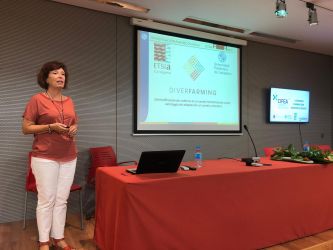The professor from the Universidad Politécnica de Cartagena (UPCT) Josefina Contreras was in charge of detailing the project’s breakthroughs
The advances in crop diversification of the European Diverfarming project were present in the “1st Training Days in Ecological Agriculture”, organised by the Regional Ministry for Water, Agriculture, Fisheries and the Environment of Murcia and held in CIFEA in Lorca on the 27th of September.
 The professor in Ecological Agriculture from the UPCT Josefina Contreras was in charge of explaining the results of the experiences of crop diversification with ecological agricultural practices of the DIVERFARMING project as an example of sustainability that can contribute to mitigating climate change.
The professor in Ecological Agriculture from the UPCT Josefina Contreras was in charge of explaining the results of the experiences of crop diversification with ecological agricultural practices of the DIVERFARMING project as an example of sustainability that can contribute to mitigating climate change.
According to the results, including legumes associated with other crops can be a good alternative to maintain fertility, increase the biodiversity and organic matter in the soil and reduce the use of nitrogen-based fertilizers, as well as reducing greenhouse gas emissions and increasing the land’s production and productivity.
The technical personnel and students who attended showed their interest in knowing the situation of the sector of the Region’s Ecological Agriculture, which is in constant expansion, and also the state of the training and research in Agroecological matters.
Diverfarming is a project financed by the Horizon 2020 Programme of the European Commission, within the challenge of “Food Security, Sustainable Agriculture and Forestry, Marine, Maritime and Inland Water Research and the Bioeconomy”, which counts on the participation of the Universities of Cartagena and Córdoba (Spain), Tuscia (Italy), Exeter and Portsmouth (United Kingdom), Wageningen (Netherlands), Trier (Germany), Pecs (Hungary) and ETH Zurich (Switzerland), the research centres Consiglio per la ricerca in agricoltura e l'analisi dell'economia agraria (Italy), the Consejo Superior de Investigaciones Científicas (Spain) and the Natural Resources Institute LUKE (Finland), the agrarian organisation ASAJA, and the companies Casalasco and Barilla (Italy), Arento, LogísticaDFM and Industrias David (Spain), Nieuw Bromo Van Tilburg and Ekoboerdeij de Lingehof (Netherlands), Weingut Dr. Frey (Germany), Nedel-Market KFT and Gere (Hungary) and Paavolan Kotijuustola and Polven Juustola (Finland).










